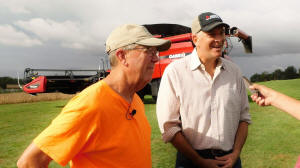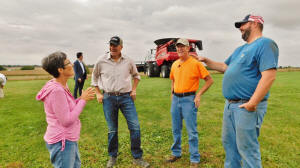|

Congressman
Darin LaHood (right) sought a deeper understanding of agriculture by
spending time with soybean farmer Ron Kindred (left) on his farm
near Atlanta this season. The two then answered key Ag issue
questions during a field day on the Kindred farm in October.
Congressman Darin LaHood represents central Illinois, which is the
top producer of corn and soybeans in the country.
He said work educating legislators in Washington D.C. is important,
and it begins with his Chicago colleagues, "People forget that Ag is
the number one industry in the state of Illinois."
His goals include "helping determine - how we have market access -
how we can continue to send our products all around the world. That
helps farmers in Illinois."

The Kindred family enjoys a light moment while visiting with
Congressman LaHood.
Infrastructure Bill
LaHood's current number one priority is the Infrastructure Bill,
which includes money for inland waterways. When it comes to getting
products to market LaHood understands, "Our system is only as good
as the infrastructure upgrades that we make on it."
Illinois Soybean Association District 9 Director and Vice-Chairman
Ron Kindred said, "The inland waterway system transports 60% of our
soybeans. So it is very important to have access to move product in
the most economical way possible to stay competitive in the open
market place."
LaHood says the LaGrange Lock and Dam near Beardstown is a model
example of what needs to be done on our waterways. Congressmen
Rodney Davis and LaHood helped secure $75 million in federal funds
to upgrade that lock and dam in 2020. The 1930s engineering, aged
concrete and wooden weirs suffered significant deterioration over
the decades from temperature fluctuations and repeated flooding
damages and the locks frequently broke downs.
In a carefully crafted plan, traffic on the Illinois River was shut
down from July to October in 2020 for upgrades on five lock and dams
that included work at Dresden Island and facilities at Marseilles
and Starved Rock.
LaGrange being a key down river traffic site received a complete
rework: all new machinery, concrete, lock chamber walls, gate
anchorages, utilities, control systems and the newest technology to
operate the miter gates. LaHood said that lock is now one of the
most efficient, effective, accountable locks anywhere on the river
system. Now we have to replicate that at Pekin and up-river on the
Mississippi.
Trade policies
Congressman LaHood says the Phase One marketing agreement with
China, and the U.S. with Mexico and Canada Agreement are "two
examples in trade that were done in a bi-partisan way that are
helping our farmers today."
"Strengthening our position in the global economy through trade and
putting pressure on China will also require Congressional
engagement. Renewing Trade Promotion Authority and working with our
allies on high-standard trade agreements that bolster our economic
partnerships throughout the globe must be priorities in our trade
agenda.
Rep. LaHood is a member of the House Ways and Means Committee,
including the Subcommittee on Trade. He serves on the House
Republican China Task Force and is the Co-Chair of the U.S.-China
Working Group. He also serves on the House Intelligence Committee.
Environmental policies
The Green New Deal bill put forth in April this year by
Representative Ocasio-Cortez, D-NY, is a mixed bag for agriculture.
Read details in the proposed bill
here
https://www.congress.gov/bill/117th-congress/house-resolution/332
The environmentally focused socio-economic bill contains proposed
climate change policies that would impact ag operations, but it also
supports Ag interests in clean renewable energy.
If passed, the Green New Deal estimated costs could be as high as
$93 trillion spread over a 10-year implementation.
In looking at the New Green Deal conversation around environmental
policy and ag, Congressman LaHood understands that it requires
caution. "We have to be careful that we are not over reaching and
hurting what farmers do. Farmers are the best stewards of the land."
WOTUS update
The 2020 Waters of the United States Rule (WOTUS) under the Clean
Water Act is an example of environmental policy that heavily impacts
Ag operations. The legislation was taken up in a number of courts
before, and since, it was passed due to its extreme measures.
This past Aug 2021, the U.S. Environmental Protection Agency invited
perspectives on WOTUS in light of the agency’s intention to revise
the definition.
A National Corn Grower Association leader told the EPA, "Federal
regulations on remote bodies of water will hurt farmers without
providing any significant improvement to water quality."
NCGA representative Andy Jobman said, “They [EPA and the U.S. Army
Corps of Engineers] must not assume that achieving desired water
quality outcomes means that remote water features must be made
waters of the U.S. The facts simply do not support this assumption
as it applies to farms, conservation practices and farmland water
management.”
Jobman said, “Corn farmers are committed to protecting this resource
for the benefit of their crops, their communities and the planet.”
“We want to focus on working together to support our water quality
protection efforts on our farms,” he said.
Sustainability and regenerative farming
In short, the aim of sustainable agriculture is to provide food,
feed, fiber and renewable energy products to meet the needs of
increasing population while not harming the environment.
Groups concerned about climate change have targeted the agricultural
system as contributing pollutants to air and water. Over the past 20
years agricultural departments and associations have introduced new
opportunities to assist farmers in how they farm to reduce
pollutants. Through communications and education, farmers
innovatively are improving operations, often increasing profits and
lowering pollutants.
Five-year data studies show highest profits can be made while using
conservation practices and fertilizer application options in
cropping. Example: page 14 shows optimal amount N use for maximum
profit.
https://www.ilcorn.org/file/594/PCM%20booklet_singles_%20Updated%20FINAL%206-2-21.pdf
[to top of second column] |
Beyond
sustainability
Illinois Soybean Association Director Ron Kindred addressed two ways
that farmers might benefit their farm and aid in improving the
environment through the newly emerging carbon market industry.
Kindred said, "Today, there are a number of conservation programs
for farmers to opt into. As yet, more research is needed in carbon
markets, but there are some programs paying minimal dollars.
"We're trying to figure out what the true value of carbon
sequestration is, and then how to pay farmers fairly for
participation."
Referencing past, present and future of conservation programs,
Kindred said, "For years many farmers have chosen conservation
practices and are still doing the work," but they are no longer
being paid for it. "Right now programs being offered are for new
conservation methods." This puts the farmer who has continued a
practice at a disadvantage. That needs to be changed.
Sustainable biofuels support agriculture, lead to cleaner air
• The Department of Energy’s Argonne National Laboratory GREET model
shows ethanol’s carbon intensity is 44 to 52% lower than gasoline’s
carbon intensity, and Argonne has found that the carbon intensity of
corn-based ethanol has declined 23% since 2005.
• Ethanol displaces the
most harmful compounds in gasoline that cause respiratory and
cardiovascular harm, according to the American Lung Association.
According to EPA data, as ethanol blending increased from one
percent to at least 10%, aromatics’ share of gasoline volume dropped
from nearly 25% to 19.3%.
- National Corn Growers Association
Disaster prevention and protection
"Several years ago, with African swine fever (ASF) spreading through
much of the world, U.S. pork producers became alarmed because of the
devastating economic impact the swine-only disease would have on the
U.S. pork industry should it reach the U.S. The National Pork
Producers Council (NPPC) began an aggressive campaign with Congress,
USDA’s Animal and Plant Health Inspection Service (APHIS) and U.S.
Customs and Border Protection (CBP) to increase protections against
ASF being introduced into the U.S." – NCCP
When ASF was found in the Dominican Republic, "the first incidence
of the disease in the Western Hemisphere in 40 years," mid-September
a letter was signed by legislators in Ag districts and sent to
Pelosi requesting funds for surveillance and control. Agriculture
Secretary Vilsack moved $500 million from USDA’s Commodity Credit
Corporation into APHIS for work on ASF prevention.
The NPPC also continues to lead the pork industry’s response to
California’s Proposition 12, a regulation that requires revamping
hog operations at a high cost to farmers, which would be passed down
to consumers. NPPC is seeking changes in the regulation attempting
to delay its implementation through the courts.
Taxes
LaHood said that this past year when the Biden administration
introduced 'stepped-up basis' in taxing of farmland and family
businesses, both Republicans and Democrats, mostly from rural
America, were able to stop that from being implemented. The
inheritance tax would have had negative consequences on the family
owned farming community.
The American farmer must stay current on regulations in all
operations from field to market, and still turn a profit while
supplying its citizens and people around the globe with food, feed,
fiber and fuels.
Additional reading and
references:
The Infrastructure Bill
LaHood Votes to Improve Infrastructure Resources for Illinois
Waterways
LaGrange Lock on the Illinois River Reopens; Other Newly ...
https://www.ilcorn.org ›
current-news › article › 2020/10
LaGrange Lock and Dam Rebuilt, Reopens - Engineering ...
https://www.enr.com ›
articles › 50623-lagrange-lock-a...
LaHood Supports the Introduction of the Next Generation Fuels Act
[The Next Generation Fuels Act of 2021 requires the Environmental
Protection Agency (EPA) to create a new 95 Research Octane Number
(RON) standard that would rise to 98 RON after 2031. It updates fuel
and infrastructure regulations to expand the availability of ethanol
blends up to E40, while requiring automobile manufacturers to design
and warrant their vehicles for the use of these fuels beginning with
the model year 2026.]
https://lahood.house.gov/news?ID=5F006040-0E06-4888-9E70-3D6E5BDBCB96
Legislation request by National Corn
Growers Association: Change oversight agency for low carbon
Sustainable Aviation Fuel (SAF) tax credits; replacing petrol oils
https://www.ncga.com/stay-informed/media/in-the-news/article/2021/08/biofuel-and-ag-leaders-call-for-accountable-life-cycle-analysis-for-saf-tax-credits
NCGA Expresses Opposition to Anti-Ethanol Legislation
https://www.ncga.com/stay-informed/media/in-the-news/article/2021/07/ncga-expresses-opposition-to-anti-ethanol-legislation
Next Generation Fuels Act Provides Key Piece of the Clean Energy
Solution
https://www.ncga.com/stay-informed/media/in-the-news/article/2021/08/next-generation-fuels-act-provides-key-piece-of-the-clean-energy-solution
Benefits of ethanol, video available:
https://ncga.com/key-issues/other-topics/high-octane-low-carbon
Want to know more about what biofuel is, does and the benefits.
Check out this easy to follow presentation
https://smallshiftbigimpact.com/
Sustainability: Choose from a variety of topics
https://www.ilsoy.org/category/utilization-sustainability
NCGA to EPA: Don’t Saddle Farmers with Unnecessary Water Regulations
https://www.ncga.com/stay-informed/media/in-the-news/article/2021/08/ncga-to-epa-dont-saddle-farmers-with-unnecessary-water-regulations
|